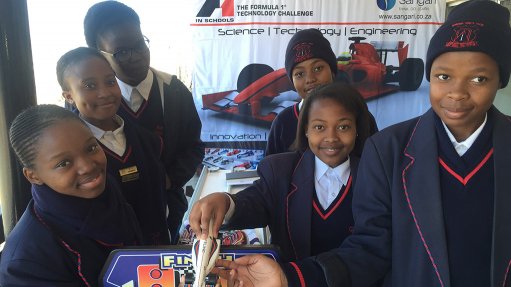
AURORA GIRLS HIGH SCHOOL TEAM Kamohelo Petlele, Nompumelelo Masuku, Jeanette Manengula, Nompumelelo Mawa, Malindi Ngobese and Asiphe Mgangane with the gas-powered F1 model car
The Formula One (F1) in Schools Technology Challenge, a worldwide competition in which 44 countries participate, promotes science, technology, engineering and mathematics skills, as well as their role in commercial operations, says South African education equipment company Sangari MD Bez Sangari.
Sangari South Africa is searching for a team to represent South Africa at the World Finals in 2017. Registration for the programme is free for all schools in South Africa.
Schoolchildren between the ages of 11 and 19 must do research and submit a business plan along with their gas-powered model F1 car; they must also get sponsorships from industrial companies and commercial businesses as part of the competition.
“The learners follow the same process as an actual F1 team and they must design, manufacture and race their own miniature F1 cars,” says Sangari South Africa F1 in Schools programme manager Pieter du Plessis.
Learners design a car using three-dimensional (3D) computer-aided design software based on the specifications set by the International Rules Committee and Computational Fluid Dynamics software to analyse their car designs. Using 3D computer-aided manufacturing software, the teams evaluate the most efficient machining strategy to make their cars.
Teams need to get sponsors for the branding of team uniforms, creating and printing pit displays and printing portfolios, as well as travel and accommodation. This also provides branding exposure for sponsors.
Sponsors are often companies in close proximity to the school and the added benefit is that graduates from the school can be absorbed into the organisation, thereby ensuring a viable return on investment, he adds.
The competition entails a comprehensive and inclusive learning approach. Learners engage with subjects that improve their skills in literacy, numeracy, sport and sports science, design and technology, art and design, textiles knowledge, science, engineering and mathematics learning, computing and business.
With regard to pedagogy, the programme focuses on experiential learning theory to enable learners to experience the challenges, victories, planning and obstacles that must be overcome to succeed. This teaches teamwork and develops communication, along with leadership skills from a young age, says Sangari.
The competition also focuses on blended learning through a cross-curricula approach, where learners apply what is learned in the classroom. “The true value lies in learners taking ownership of their own learning,” explains Sangari.